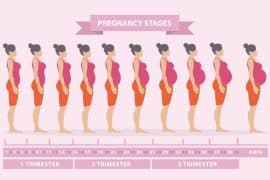Are You Expecting Twins? Signs to Look Out For
The anticipation of pregnancy comes with a whirlwind of emotions and, for some, the possibility of expecting more than one little bundle of joy.

If you find yourself unusually exhausted or battling intense bouts of queasiness, you might be wondering, could there be twins on the way? Let’s explore the signs and symptoms associated with a twin pregnancy, offering you insights into this exciting yet challenging journey.
Are You Expecting Twins
Early Indicators: A Sneak Peek into Twin Pregnancy
Discovering a twin pregnancy isn’t an instant revelation. Your healthcare provider won’t confirm it definitively until your first-trimester ultrasound, typically performed between 6 and 9 weeks, although it can be conducted earlier if needed.
There are subtle hints, though, that might give you a clue. Elevated human chorionic gonadotropin hormone (hCG) levels, which are produced soon after embryo implantation, can sometimes indicate the presence of twins as early as 5 weeks.
However, this isn’t a guaranteed sign, and the ultrasound remains the gold standard for confirmation.
Unfortunately, there’s a phenomenon known as vanishing twin syndrome, where about 20 to 30 percent of the time, one twin is lost in the first trimester.
Advanced medical technology allows for early detection, leading to increased reports of this syndrome. The good news is that when this occurs early on, the remaining baby typically thrives, resulting in a healthy pregnancy.
Confirming Twin Pregnancies: The Role of Ultrasound
While your intuition might whisper the possibility of twins, a formal confirmation only comes with an ultrasound in the first trimester.

Usually conducted before week 14, this ultrasound can be scheduled earlier (between weeks 6 and 9) to date the pregnancy or ensure its viability, especially after fertility treatments. Additionally, specific markers in your blood work could raise suspicions:
Elevated hCG Levels
Higher hCG levels, more pronounced in a multiple pregnancy, might prompt your practitioner to investigate the possibility of twins.
High Alpha-fetoprotein
This protein, originating from your baby’s liver, can be detected in your blood. Elevated levels suggest the presence of more than one baby.
Recognizing Twin Pregnancy Symptoms: What to Expect
Twin pregnancies often come with intensified pregnancy symptoms. While experiences vary, some common signs include:
Severe Morning Sickness
Nausea and vomiting might be more intense due to elevated hCG levels, potentially lasting longer. Severe and longer morning sickness, known as hyperemesis gravidarum, is more common in mothers expecting twins.
Digestive Discomfort
Increased crowding in your abdomen can lead to digestive problems such as heartburn, indigestion, and, more often, constipation.
Fatigue
Carrying twins means your body works twice as hard. Combined with extra weight and potential sleep disturbances, fatigue can be overwhelming.
Early Weight Gain
Twin pregnancies often entail faster weight gain, with experts recommending 37 to 54 pounds for a normal-weight mom expecting twins.
Heightened Appetite
Expect a surge in hunger to accommodate the extra nutritional needs, although severe morning sickness might challenge your calorie intake.
Distinct Foetal Movements
Feeling movement in different areas of your abdomen simultaneously is common in twin pregnancies. With two active babies, you might experience kicks and punches in various locations.
Risk Factors: Are Twins in Your Future?
Certain factors increase the likelihood of a twin pregnancy:
Age Over 35
Higher levels of the reproductive hormone FSH elevate the chances of releasing two eggs during ovulation.
Fertility Treatments
Any treatment stimulating ovulation or implantation of more than one embryo raises the odds of twins.
Overweight or Obesity
A BMI over 30 at conception enhances the likelihood of fraternal twins.
Ethnicity
Twin pregnancies are more common among Black women compared to Hispanics and Asians.
Family History
If fraternal twins run in your family, your chances of having twins increase.
While the first few weeks might not offer a definitive answer, these signs and risk factors, coupled with the knowledge that an ultrasound will provide clarity by the end of your first trimester, allow parents-to-be to navigate the exciting possibility of welcoming two bundles of joy into their lives.
Stay tuned for the delightful pitter-patter of four tiny feet, a testament to the extraordinary journey ahead.
For more great articles like this see our informational articles here




